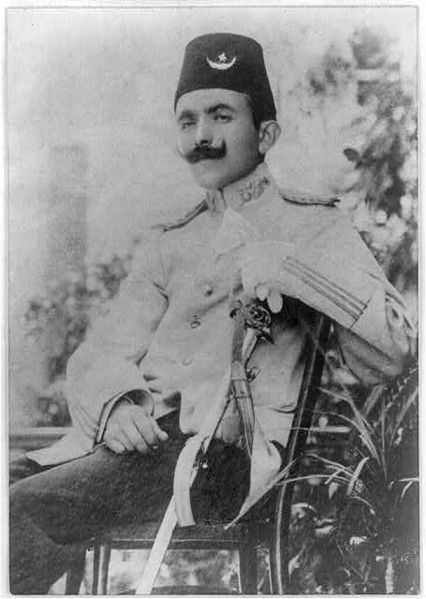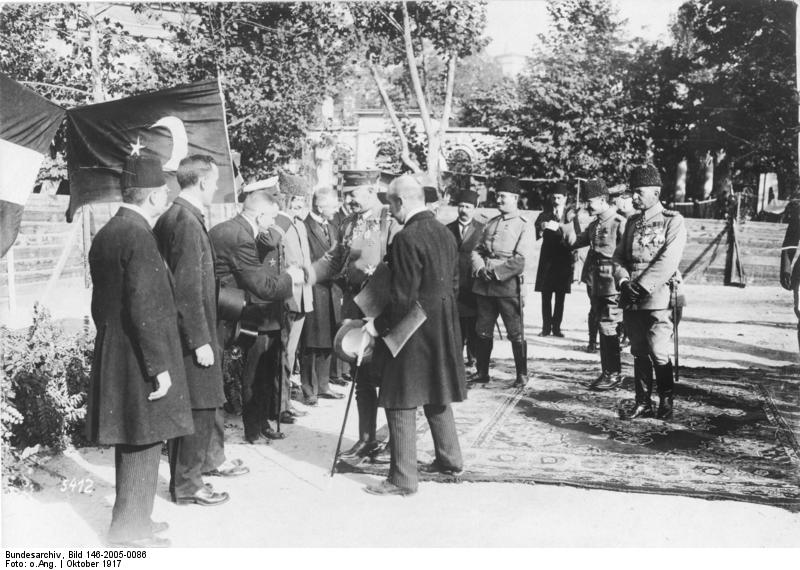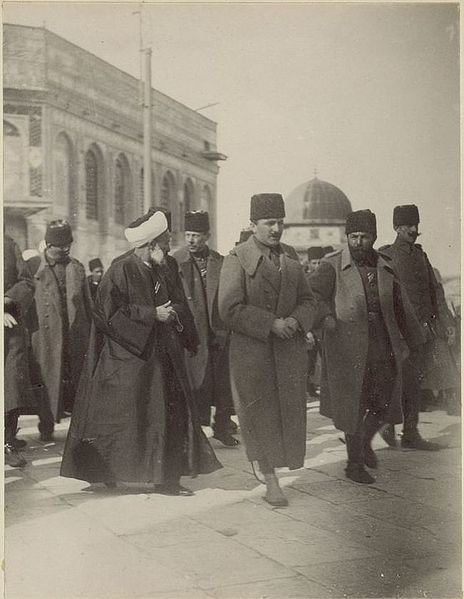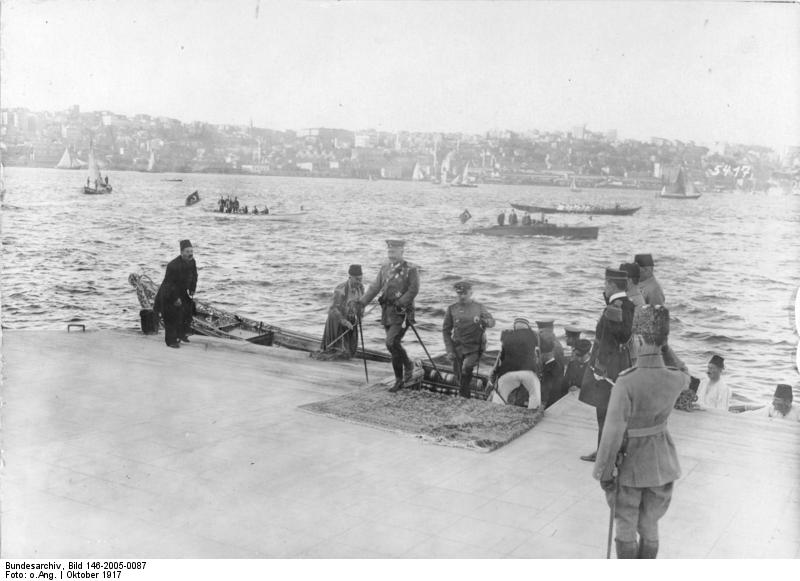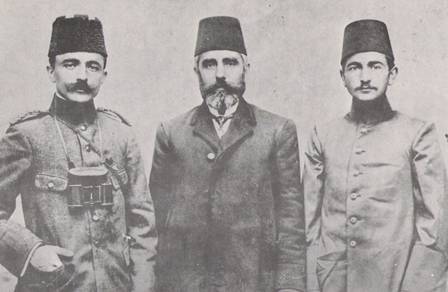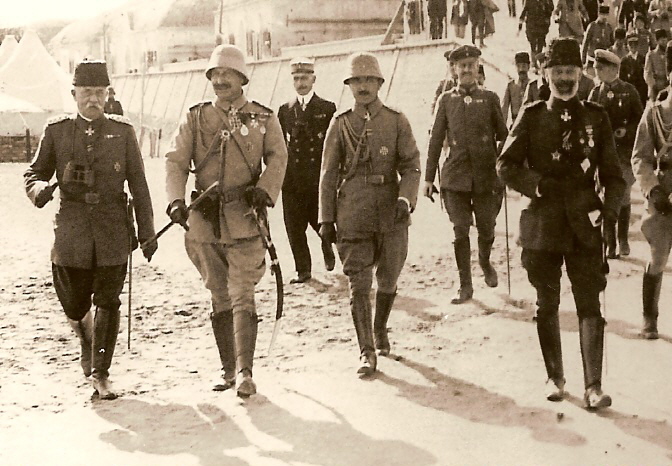<Back to Index>
- Mathematician and Engineer Émile Michel Hyacinthe Lemoine, 1840
- Composer Wilhelm Friedemann Bach, 1710
- Minister of War General Ismail Enver Pasha, 1881
PAGE SPONSOR
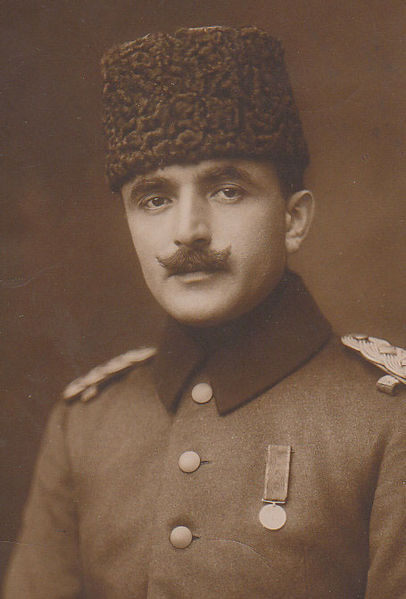
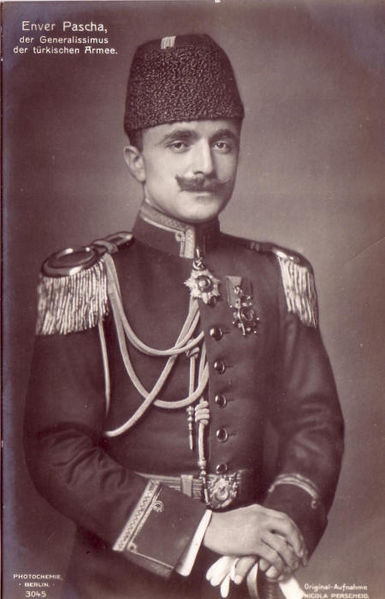
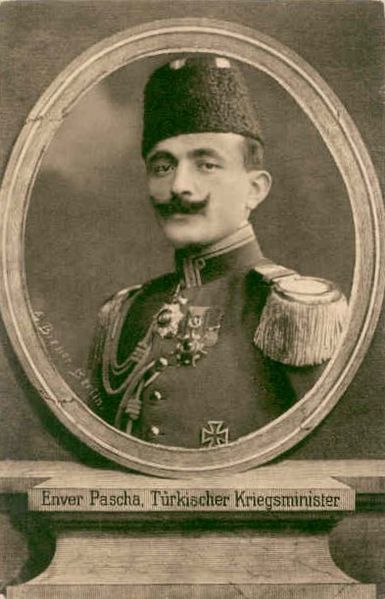
Enver Pasha (Ottoman Turkish: انور پاشا, Turkish: Enver Paşa) or Ismail Enver Pasha (اسماعیل انور پاشا, İsmail Enver Paşa, born Ismail Enver) (November 22, 1881 – August 4, 1922), title was changed with his military ranks such as Enver Efendi (انور افندي), Enver Bey (انور بك), Enver Pasha, higher than Mirliva) was an Ottoman military officer and a leader of the Young Turk revolution. He was the main leader of the Ottoman Empire in both Balkan Wars and World War I.
According to Mark Mazower, Enver Bey's father was a Turkish bridge - keeper and his mother an Albanian peasant. He studied for different degrees in military schools in the empire and finally he graduated from the Harp Akademisi in 1903. He became a Major in 1906. He was sent to the Third Army, which was stationed in Salonica. During his service in the city, he became a member of the Committee of Union and Progress (CUP).
In 1908, the Young Turk Revolution broke out in Salonica, and the young Enver quickly became one of its military leaders. The successful revolt brought the CUP to power, ushering the so-called "Second Constitutional Era" of the Ottoman Empire. During the course of the next year, a reactionary conspiracy to organize a countercoup culminated in the "31 March Incident", which was put down. Enver Bey took an active role in the suppression of the uprising in the government. Afterwards, he was sent to Berlin as a military attaché, where he grew to admire the German military culture, and strengthened the military ties between Germany and the Ottoman Empire, inviting German officers to reform the Ottoman Army.
In 1911, Italy launched an invasion of the Ottoman vilayet of Tripolitania (Trablus-i Garb, modern Libya), starting the Italo - Turkish War. Enver decided to join the defense of the province and left Berlin for Libya. There, he assumed the overall command, but in the end Italy took control of Libya and Enver Bey had to return to Istanbul. In 1912, thanks to his active role in the war, he was made Lieutenant Colonel in 1912. However, the defeat cost the CUP in popularity, and it fell from government, to be replaced by the Liberal Union. In October 1912, the First Balkan War broke out, where the Ottoman armies suffered severe defeats at the hands of the Balkan League. These military reversals weakened the government, and gave Enver his chance to grab for power. In a coup in January 1913, the Young Turks took power, with Enver as War Minister, and left the peace negotiations then under way in London. The renewed hostilities only worsened the Empire's situation, however, as the two major remaining strongholds of Adrianople (Edirne) and Yannina fell to the Bulgarians and the Greeks, respectively, forcing the Ottomans to concede defeat at the Treaty of London.
In June 1913, however, the Second Balkan War broke out between the Balkan Allies. Enver Bey took advantage of the situation and led an army into Eastern Thrace, recovering Adrianople from the Bulgarians, who had concentrated their forces against the Serbs and Greeks. After this success, Enver Bey became a Pasha.
After these political and military achievements, he introduced a military dictatorship that came to be called the Three Pashas (Enver Pasha, Talaat Pasha, and Djemal Pasha). In 1914, he was again Minister of War in the cabinet of Sait Halim Pasha, and married HIH Princess Emine Naciye Sultan (Istanbul, Ortaköy, Ortaköy Palace, November 25, 1898 – Istanbul, Nişantaşı,
Nişantaşı Palace, December 5, 1957), the daughter of Prince
Süleyman, thus entering the royal family. His power grew steadily
while Europe marched towards total war.
Enver Pasha was an architect of the Ottoman - German Alliance, and expected a quick victory in the war that would benefit the Ottoman Empire. Without informing the other members of the Cabinet, he allowed the two German warships SMS Goeben and SMS Breslau, under the command of German admiral Wilhelm Souchon to enter the Dardanelles to escape British pursuit; the subsequent "donation" of the ships to the neutral Ottomans worked powerfully in Germany's favor, despite French and Russian diplomacy to keep the Ottoman Empire out of the war. Finally on October 29, the point of no return was reached when Admiral Souchon, now Commander - in - Chief of the Ottoman navy, took Goeben, Breslau and a squadron of Ottoman warships into the Black Sea and raided the Russian ports of Odessa, Sevastopol and Theodosia. Russia declared war on Ottoman Empire on November 2, and Britain followed suit on November 5. Most of the Turkish cabinet members and CUP leaders were against such a rushed entry to the war, but Enver Pasha thought that it was the right thing to do.
As
soon as the war started, October 31, 1914, Enver ordered that all men
of military age report to army recruiting offices. The offices were
unable to handle the vast flood of men and long delays occurred. This
had the effect of ruining the crop harvest for that year.
Enver proved ineffective as War Minister, and frequently over the next four years the Germans had to support the Ottoman government with generals such as Otto Liman von Sanders, Erich von Falkenhayn, Colmar Freiherr von der Goltz, and Friedrich Freiherr Kress von Kressenstein. The Germans also gave the Ottoman government military supplies, soldiers, and fuel.
Enver Pasha’s message to the army and the people was “war until final victory”. During the war, living conditions deteriorated rapidly, and discontent grew. The government of CUP spent much more money than it took in, and the inflation rate over the four years of war was greater than 1600%.
Enver Pasha assumed command of the Ottoman forces arrayed against the Russians in the Caucasus theatre. He wanted to encircle the Russians, force them out of Ottoman territory and take back Kars and Batumi, which had been ceded after the Russo - Turkish War of 1877 - 78. Enver thought of himself as a great military leader, while the German military adviser, Liman von Sanders, thought of him as a military buffoon. Enver ordered a complex attack on the Russians, placed himself in personal control of the Third Army, and was utterly defeated at the Battle of Sarikamish in
December – January 1914 – 1915. His strategy seemed feasible on paper, but
he had ignored the external conditions such as the terrain and the
weather. Enver's army (90,000 men) was defeated by the Russian force
(100,000 men) and in the subsequent retreat, tens of thousands of
Turkish soldiers died. This was the single worst defeat of an Ottoman army in all of World War I. On his return to Istanbul,
Enver Pasha blamed his failure on his Armenian soldiers, forgetting
that in January 1915 an Armenian named Hovannes saved his life during a
battle by carrying Enver on his back through battle lines. He later initiated the repressive measures against the empire's Armenian population that were an early stage of the Armenian Genocide.
After his defeat at Sarıkamısh, Enver returned to Istanbul and took command of the Turkish forces around the capital. He was confident that the capital was safe from any Allied attacks. The British and French were planning on forcing the approaches to Istanbul in
the hope of knocking the Ottomans out of the war. A large Allied fleet,
largely composed of older battleships unfit for duty against the German High Seas Fleet, assembled and staged an attack on the Dardanelles on March 18, 1915. The attack (the forerunner to the failed Gallipoli campaign)
left the Turks - and Enver - demoralized. As a result, Enver turned
over command to Liman von Sanders, who led the successful defence of
Gallipoli, along with Mustafa Kemal. Later, after many towns on the
peninsula had been destroyed and women and children killed by the Allied
bombardment, Enver proposed setting up a concentration camp for the
remaining French and British citizens in the empire. Henry Morgenthau, the American ambassador to the Ottoman Empire, managed to convince Enver not to go through with this plan.
Ismail Enver has been accused of war crimes and mass murder for his role in the Armenian genocide, Greek genocide and Assyrian Genocide along with the Ottoman Caliph Mehmed V.
During 1917, due to the Russian Revolution and subsequent Civil War, the Russian army in the Caucasus had ceased to exist. At the same time, the CUP managed to win the friendship of the Bolsheviks with the signing of the Ottoman - Russian friendship treaty (January 1, 1918). Enver looked for victory when Russia withdrew from the Caucasus region. When Enver discussed his plans for taking over southern Russia, the Germans told him to keep out. Undeterred, Enver ordered the creation of a new military force called the Army of Islam which would have no German officers. Enver's Army of Islam avoided Georgia and marched through Azerbaijan. The Third Army was also moving forward to pre-war borders.
The Third Army, moved towards the Democratic Republic of Armenia, which formed the frontline in the Caucasus. General Tovmas Nazarbekian was the commander on the Caucasus front and Andranik Toros Ozanian took the command of Armenia within the Ottoman Empire. Vehib Pasha forced Armenians to retreat and then captured Trabzon, where the Russians had left huge quantities of supplies. Then the army turned towards Georgia.
The Army of Islam, under the control of Nuri Pasha, moved forward and attacked with General Lionel Charles Dunsterville at Baku. General Dunsterville ordered the evacuation of the city on September 14, after six weeks of occupation, and withdrew to Iran; most of the Armenian population escaped with British forces. The Ottomans and their Azeri allies, after the Battle of Baku, entered the city on September 15.
However, after the Armistice of Mudros between Great Britain and the Ottoman Empire on October 30, Ottoman troops were replaced by the Triple Entente. These conquests in the Caucasus counted for very little in the war as a whole.
Faced with defeat, the Sultan dismissed Enver from his post as War Minister on October 4, 1918, while the rest of Talat Pasha's government resigned on October 14, 1918. On October 30, 1918, the Ottoman Empire capitulated by signing the Armistice of Mudros. Two days later the "Three Pashas" all fled into exile. On January 1, 1919, the new government expelled Enver Pasha from the army. He was tried in absentia in the Turkish Courts - Martial of 1919 - 20 for crimes of “plunging the country into war without a legitimate reason, forced deportation of Armenians and leaving the country without permission” and condemned to death.
Enver first went to Germany in October 1918 where he communicated and worked with German Communist figures like Karl Radek. In October 1919, Enver left for Moscow in order to serve as a secret envoy for his friend General Hans von Seeckt who wished for a German - Soviet alliance. In
August 1920, Enver sent Seeckt a letter in which he offered on behalf
of the Soviet Union the partition of Poland in return for German arms
deliveries to Soviet Russia. Besides working for General von Seeckt, Enver envisioned cooperation between the new Soviet Russian government against the British, and went to Moscow. There he was well received, and established contacts with representatives from Central Asia and other exiled CUP members as the director of the Soviet Government's Asiatic Department. He also met with Bolshevik leaders, including Lenin. He tried to support the Turkish national movement and corresponded with Mustafa Kemal, giving him the guarantee that he didn't intend to intervene in the movement in Anatolia.
Enver Pasha went to Baku between September 1 and 8, 1920 to take part
in the failed "Congress of Eastern Peoples", representing Libya,
Tunisia, Algeria and Morocco. He later returned to Berlin where he tried
to establish a secret organization that would transfer Russian military
assistance to Turkey, an attempt that eventually failed.
On July 30, 1921, with the Turkish War of Independence in full swing, Enver decided to return to Anatolia. He went to Batum to be close to the new border. However, Mustafa Kemal didn't want him among the Turkish revolutionaries. Mustafa Kemal had stopped all friendly ties with Enver Pasha and the CUP as early as 1914, and he explicitly rejected the pan - Turkic ideas and what Mustafa Kemal perceived as Enver Pasha's utopian goals. Enver Pasha changed his plans and traveled to Moscow where he managed to win the trust of the Soviet authorities. In November 1921 he was sent by Lenin to Bukhara in the Turkestan Autonomous Soviet Socialist Republic to help suppress an uprising against the local pro-Moscow Bolshevik regime. However, instead he made secret contacts with some of the rebellion's leaders and, along with a small number of followers, defected to the basmachi side. His aim was to unite the numerous basmachi groups under his own command and mount a co-ordinated offensive against the Bolsheviks in order to realize his pan - Turkish dreams. After a number of successful military operations he managed to establish himself as the rebels' supreme commander, and turned their disorganized forces into a small but well drilled army. His command structure was built along German lines and his staff included a number of experienced Turkish officers.
From David Fromkin's - "A Peace to End All Peace," - "However Enver's personal weaknesses reasserted themselves. He was a vain, strutting man who loved uniforms, medals and titles. For use in stamping official documents, he ordered a golden seal that described him as 'Commander - in - Chief of all the Armies of Islam, Son - in - Law of the Caliph and Representative of the Prophet.' Soon he was calling himself Emir of Turkestan, a practice not conducive to good relations with the Emir whose cause he served. At some point in the first half of 1922, the Emir of Bukhara broke off relations with him, depriving him of troops and much needed financial support. The Emir of Afghanistan also failed to march to his aid."
On August 4, 1922, however, as he allowed his troops to celebrate the Idi Qurbon holiday and kept a guard of 30 men at his headquarters near the village of Ab-i-Derya near Dushanbe, the Red Army Bashkir cavalry brigade under the command of Yakov Melkumov (Agop Melkumian) launched a surprise attack. According to some sources, Enver and some 25 of his men mounted their horses and charged the approaching troops, during which Enver was killed by machine gun fire. In his memoirs Enver Pasha's aide Yaver Suphi Bey stated that Enver Pasha died of a bullet wound right above his heart during a cavalry charge. Alternatively, according to Melkumov's memoirs, Enver managed to escape on horseback and hid for four days in the village of Chaghan. His hideout was located after a Red Army officer infiltrated the village in disguise. Melkumov's troops then stormed Chaghan, and in the ensuing combat Enver was killed by Melkumov himself.
From David Fromkin's - A Peace to End All Peace - "There are several accounts of how Enver died. According to the most persuasive of them, when the Russians attacked he gripped his pocket Koran and, as always, charged straight ahead. Later his decapitated body was found on the field of battle. His Koran was taken from his lifeless fingers and was filed in the archives of the Soviet secret police."
Enver's body was buried near Ab-i-Derya. In 1996, his remains were brought to Republic of Turkey and reburied in Istanbul Şişli Abide-i Hürriyet (Obelisk of Freedom) cemetery.
